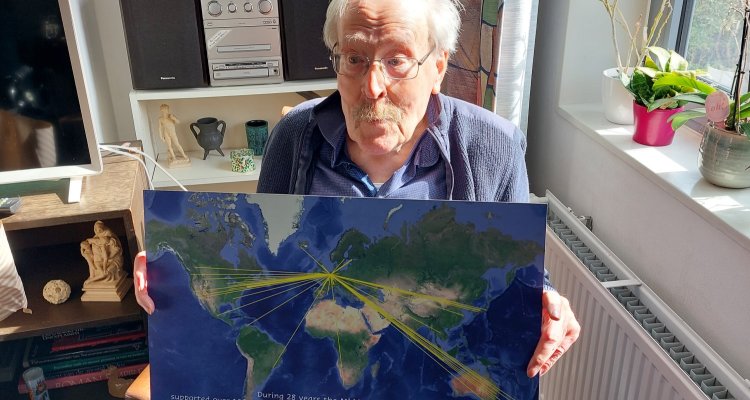Dedicated Support: Middelhoven Fund Marks 28 Years of Empowering Students through Internship Sponsorship
The Middelhoven Fund was initiated by Wout Middelhoven, associate professor at the Laboratory for Microbiology. Since its founding twenty-eight years ago, the fund has supported students in financing their internships.
Dr Wout Middelhoven, then sixty years of age and working as an associate professor at the Wageningen Laboratory for Microbiology, decided in 1995 to give back to the university. Not a person who desires luxuries, he used his own financial means to establish the Middelhoven Fund. The fund provides students who want to pursue an internship in microbiology with a grant of 350 euros to cover, for example, travel expenses. ‘An internship can be invaluable in career-building because students gain new experiences and network contacts during an international internship’, says Dr Servé Kengen, an assistant professor at the laboratory.
‘In the last 28 years, some one hundred students have applied for the grant’, says Kengen. ‘That includes Thijs Ettema, our chairholder’. Middelhoven is currently eighty-eight, and the laboratory owes him a debt of gratitude. The lab is currently investigating a way to continue the fund in the event Wout Middelhoven should no longer be able to continue his contribution.
A trip to the United States
Antoine van Dijk’s experience is exemplary. He used the grant to travel to Yellowstone National Park in Montana, USA. ‘As a master’s student, I asked myself what I would like to learn more about, and chose interaction between microbes. Professor John van der Oost informed me of a research group in Yellowstone that investigated viruses in hot springs. We focused specifically on bacteriophages: viruses that affect bacteria. That was precisely my area of interest.’
Antoine became part of a small research group. Together with PhD students, he sought to identify which bacteria served as hosts for the viruses in the water. ‘There, I learned a hands-on approach that I still appreciate. If we were in need of samples, we would hop into a vehicle with our test tubes. If we suspected the microbes might not survive the trip, we would stop along the way to buy dry ice at a gas station.’ For Antoine and many other students, this autonomy is a crucial experience. ‘Sometimes you simply have to be creative and get things done.’
Cost of living in New Zealand
Master’s student Sarah de Roode discovered an intense fascination with bacteria in general and bacteriophages in particular during her thesis. There are not many specialists in this domain at Wageningen University & Research. ‘My supervisor Raymond Staals shared a list of international contacts, and a professor in New Zealand immediately stood out. Plus, the country itself is beautiful.’ Contrary to her expectations, the department invited Sarah. ‘There were very few spots available, so I was genuinely thrilled when I received a positive response.’
The trip is expensive, and the daily cost of living in New Zealand is also considerable. When Sarah read about the Middelhoven Fund during her internship, she decided to apply. ‘It saved me quite some financial worries,’ she says.
Sarah has only just returned to the Netherlands. ‘I am almost done completing my master’s and will certainly pursue a PhD’, she says. ‘During my internship, I acquired valuable contacts and learned new methods, which will be useful in further research on bacteriophages.’
Trying advanced technology
Lot van der Graaf wanted to join a summer school in the United States that focuses on students who are passionate about microbial diversity. ‘I was midway through my PhD’, she explains. ‘I thought it might be an excellent way to immerse myself further in microbiology.’ The summer school would provide her with the opportunity to interact intensively with leading scientists, do interesting field work and learn new things in the lab. ‘I had heard about the Middelhoven Fund, so I decided to apply in order to cover some of the expenses for the trip to the United States.’
The summer school not only fanned her enthusiasm for microbiology, says Lot. It also taught her new skills. ‘A leading microscope manufacturer contributed to the curriculum. That gave us the opportunity to try out some cutting-edge technology. The skills I acquired could then be applied to my research on micro-organisms that are able to survive under extreme conditions.’
Lot is currently working on her postdoc in Spain, which focuses on micro-organisms in mining areas. ‘My passion for my domain is still very much alive. Moreover, the summer school taught me how to better support and inspire students.’

